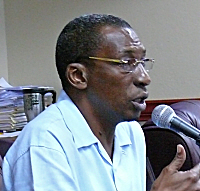
Sen. Usie Richards delayed the start of the hearing by an hour in hopes that more senators would arrive. By 11 a.m., the committee still was short of a quorum, but Richards decide to proceed with hearing testimony. Sens. Ronald Russell and Samuel Sanes arrived shortly thereafter and participated in questioning, but the committee still needed a fourth member to vote.
Absent were Sens. Alicia Hansen, Patrick Simeon Sprauve, Celestino White, and Carlton Dowe.
Sens. Louis Patrick Hill and Terrence Nelson were also in attendance, but since they are not members of the committee their presence did not count towards quorum.
Sen. Terrence Nelson, the sponsor of the bill under discussion, said the goal of the legislation was to relieve the bottleneck of cases in the Superior Court by allowing magistrate judges to try more criminal cases. Currently magistrate judges can hear misdemeanor cases in which the potential penalty is six months or less. The bill would have allowed magistrate judges to try all misdemeanors, regardless of the length of the penalty.
Attorney General Vincent Frazer, Chief Territorial Public Defender Debra Smith-Watlington and Presiding Judge Darryl Dean Donohue testified against the bill. They said they supported the aims of the bill, but preferred an alternative solution they were developing as part of a judicial ad hoc committee.
Donohue said the judicial system could still better utilize the magistrate judges without increasing their jurisdiction by shortening the maximum sentence for certain misdemeanor offenses to six months or less. He said that aspects of the V.I. Code regarding punishments were outdated and should be modernized.
“Many of our misdemeanors were being willy-nilly categorized as one-year misdemeanors going back to the 1900s code,” Donohue said. “It isn’t really realistic in terms of today’s criminal justice system.”
Donohue said the ad hoc committee was reviewing all misdemeanor offenses in the V.I. Code and separating them into three categories of severity. Class A misdemeanors will carry a penalty of six months to one year, penalties for class B misdemeanors will be three months to six months, and class C misdemeanors will carry punishments of no more than three months.
Donohue said class C and B misdemeanors could be upgraded to a higher misdemeanor in the case of repeat offenders.
Nelson asked Donohue why the legislative ad hoc committee objected to magistrate judges hearing cases in which the penalty could be more than six months.
Donohue replied that the issue was complicated, but to a large degree it boiled down to logistics. Magistrate judges currently only oversee bench trials, those without a jury. This is allowable under the law for offenses deemed petty crimes. The law stipulates, however, that any offense that carries a sentence of one year or more cannot be considered petty, so they must be tried before a jury.
Expanding the magistrate judges’ jurisdiction would provide more total judges to hear these cases, Donohue conceded, but it would also require the judicial system to find more jurors (a difficult and time consuming process, he said) and increase demand on courtrooms with jury boxes.
The system would be more efficient if more cases were being handled through bench trials, he concluded.
Richards said the committee could not take any action on the bill without a quorum, but if they could they likely would have tabled the bill and waited for the ad hoc committee to finish its work before considering the issue again.
A second bill was briefly discussed before the committee adjourned due to lack of quorum. The legislation would have established a judicial branch management committee with the intent of making the courts more efficient.
Chief Justice of the V.I. Supreme Court Rhys S. Hodge testified that he would like to see the bill tabled for the time being. He announced that the judicial branch had received a grant to hire an independent company to conduct a study of the justice system’s practices and asked that senators wait to revisit the issue until that report is done so their suggestions could be added to the bill.
Hill, the bill’s sponsor, agreed that this would be the correct course of action, but stated with some frustration that the lack of quorum meant the committee had little choice in the matter.
“Unfortunately we won’t accomplish very much today,” he said. “I apologize to the justices, to the attorney general and Ms. Waltington for not being able to do anything today and having you here when you probably have a lot of other really important things to do.”





